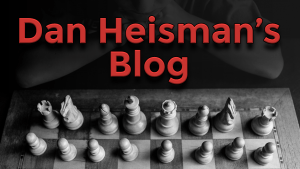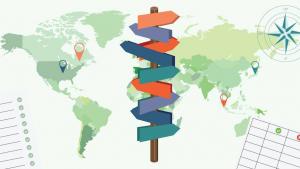Q&A with Coach Heisman May 16, 2014
"I am stuck at 1700. Does that make me studid?"
"Is there a correlation between chess rating and IQ?"
One of the world's leading physicists and expert on string theory is Ed Witten. Ed took up chess for a while and what was his rating? 1700. I doubt anyone would consider calling Ed stupid; he just chose to spend more of his abilities on developing his string theories. Albert Einstein had many of the superb visualization capabilities that aid your chess analysis, but he also chose to develop them in the field of physics, instead.
Many years ago I saw a study where psychologists took a bunch of grandmasters and gave them a battery of tests. Their conclusion: The average grandmaster is more intelligent than the average person, but not remarkably so. The only common trait the grandmasters shared was having played an inordinate number of chess games.
On that same subject, a chess master told me many years ago "Never confuse ignorance with stupidity" (the corallary is "Never confuse knowledge with intelligence").
I suggest to my students "Ask me what this guy in China had for breakfast this morning". When they do, my answer is "I don't know." Then I suggest they ask whether I feel bad about that. I don't, any more than anyone learning chess should feel bad they don't know something that they are trying to learn. I am ignorant of what the Chinese gentleman had for breakfast, but that does not make me ignorant. I would be ignorant only if I did not know something I was supposed to know, like "Who is the President of the United States?" or "On what continent is China located?"
"What are the most productive ways to work with a study buddy?"
There are many answers to this question. Here are just a few:
- You can learn chess tabiyas (standard opening sequences). Pick one you want to learn and have you and your buddy both play each side multiple times. Then let him pick one he wants to learn and repeat the process.
- Review each other's games together and analyze carefully, playing out positions where you disagree. Try to locate "The losing move" (the move of the loser, after which even perfect play would not have saved him).
- Bring a favorite puzzle and have him try to solve it. Then reverse roles.
- Each bring a favorite game (played by a GM or someone else) to review
- Play speed chess but ask your study partner only to play certain lines you are trying to learn. After playing the games and reviewing the openings with a book, engine, or database, reverse roles.
"Can you play as well as Carlsen Magnus?"
Of course! Thank goodness the Magnus family named their son Carlsen, and he was a bad chess player. I can't possibly compete with the Carlsen family's son Magnus.
"I think speed chess helps my tactical recognition. Am I fooling myself just because I like blitz?"
Absolutely blitz can help your tactical vision! For more on the benefits of blitz play (but only for those past the beginner stage, where it can be frightfully frustrating), see my Novice Nook column Getting the Edge.
Speaking of Novice Nook, Chess Cafe has been reorganizing for a few months and has not published any new columns. However, that is soon to end and a new column is slated to come out in June. After a 13 year run of my best advice on how anyone can improve at chess, it has felt strange not to have to submit a column every month!
At one point in the show things were quiet so I put up a puzzle by Cheron, which I first saw in Chernev's fun book The Bright Side of Chess. Things got busy and I did not have time to show the answer, too, so that's included (Note: I put on the title of the puzzle diagra, "White to play and mate in 3" but for some reason it does not show, so I'm including it here):
Someone complimented me on being talented - don't know if they were kidding, but that opened up the opportunity to once again go baritone and sing the Mad Magazine parody Bishop's Away (to the tune of Anchor's Away). For complete lyrics, check out the article on the Jun 21, 2013 show.
"Which of the books you wrote is your favorite?"
That's always tough. Many are surprised to hear I've written 11! During the show I displayed the new second editions of Looking for Trouble and The Improving Chess Thinker. I've often said that Looking for Trouble, about recognizing and meeting threats, was perhaps my most underrated book. But lately I've said that The World's Most Instructive Amateur Game Book (TWMIAGB) may be my favorite.
I recently heard from a student who said TWMIAGB was fantastic and it was much better than he thought it would be. That surprised me, and I asked why he didn't think it would be so good. He replied that the title turned him off a little since he thought "What can I learn from amateur games?" but it turned out he learned a ton because the book has so much good general advice. I might add its a book of amateur (below 2200) games, not a book of beginner games. There's hardly any pieces put en prise among those 30 heavily annotated games .
.






